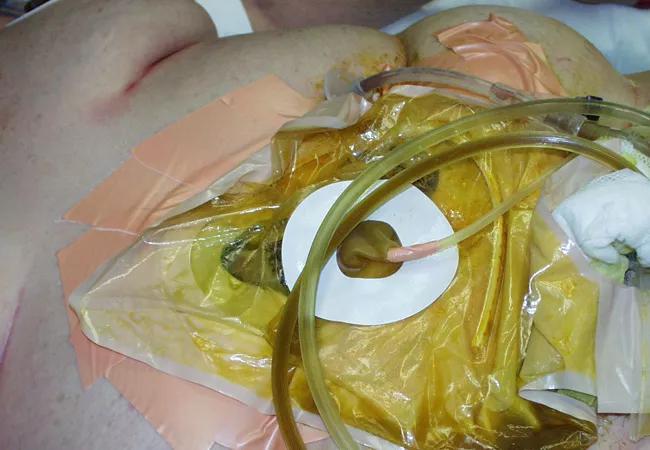New center will facilitate care for complex cases

In response to the increasing number of referrals for major abdominal surgeries involving anastomotic leaks, abdominal catastrophes and complex and re-operative surgery, Cleveland Clinic’s Digestive Disease & Surgery Institute has created the Center for Re-operative and Catastrophic Abdominal Surgery to facilitate expert multidisciplinary care, and expedite referrals and transfers.
Advertisement
Cleveland Clinic is a non-profit academic medical center. Advertising on our site helps support our mission. We do not endorse non-Cleveland Clinic products or services. Policy
“Our goal is to provide integrated, multispecialty care for these complex patients, and the surgeons and care teams looking after them,” says Chairman Conor P. Delaney, MD, PhD, who will be coordinating the center with a team of experienced physicians from across the institute and enterprise.
“We are fortunate in that we have a high baseline volume of complex cases, as well as access to highly experienced medical teams in surgery, anesthesia, gastroenterology, radiology, ICU and critical care transport,” Dr. Delaney says. “Additionally, we have specialized expertise within our own institute in bariatric surgery, upper gastrointestinal surgery, colorectal surgery, abdominal wall reconstruction, and hepatobiliary and pancreatic surgery.”
Dr. Delaney notes that Cleveland Clinic is the only hospital system in the U.S. to have a specific gut rehabilitation and transplantation and nutrition teams that specialize in the most complex abdominal re-operative cases, including short bowel syndrome (SBS or short gut), multiple recurrent enterocutaneous fistula (ECF), management of total parenteral nutrition (TPN), and even intestinal and multivisceral transplantation.
“When people have gastrointestinal surgery, it usually involves an anastomosis,” he explains. “Anastomotic leaks can be associated with high mortality and are often devastating for patients. They also are complicated and stressful for surgical teams that may not have as much experience or as many resources for these complications as our multidisciplinary team in the Digestive Disease & Surgery Institute. With teams who specialize in everything from major re-operative surgery, to endoscopic management, to parenteral nutrition and intestinal transplantation, we can help manage these complex abdominal situations, or provide counsel and informed options.”
Advertisement
The center accepts air transfers and also provides treatment for more stable patients recovering from surgery. With the establishment of the center, medical teams can initiate a referral or seek expert advice through a centralized hub, with a dedicated staff. Virtual visits and phone consults also are encouraged.
The multidisciplinary approach is integral to the success of the Center for Re-operative and Catastrophic Abdominal Surgery. The center relies on the expertise of world-class physicians and their teams, notably:
Abdominal Wall Complications and Major Ventral Hernia: Michael Rosen, MD
Bariatric Surgical Reoperation and Complications: Ali Aminian, MD
Colorectal Surgery Reoperation, Recurrent Cancer and Complications: Scott Steele, MD, MBA
Enterostomal Therapy and Complex Wound Care: Ronald A. Rock, MSN, RN, ACNS-BC and Christi Cavaliere, MD
Gut Rehabilitation, Entero-cutaneous Fistulas, Short Bowel Syndrome and Intestinal Transplantation: Kareem Abu-Elmagd, MD, PhD
Hepatobiliary Surgery Reoperation and Complications: Matthew Walsh, MD
Interventional Endoscopy and Non-Operative Complication Management: Bo Shen, MD and John Vargo, MD
Parenteral Nutrition and Nutritional Failure: Donald Kirby, MD
Upper GI Surgery Reoperation and Complications: John Rodriguez, MD
Referring clinicians may contact the center at 216.636.1834 or DDSInavigator@ccf.org.
Advertisement
Advertisement

Benefits of neoadjuvant immunotherapy reflect emerging standard of care

Multidisciplinary framework ensures safe weight loss, prevents sarcopenia and enhances adherence

Study reveals key differences between antibiotics, but treatment decisions should still consider patient factors

Key points highlight the critical role of surveillance, as well as opportunities for further advancement in genetic counseling

Potentially cost-effective addition to standard GERD management in post-transplant patients

Findings could help clinicians make more informed decisions about medication recommendations

Insights from Dr. de Buck on his background, colorectal surgery and the future of IBD care

Retrospective analysis looks at data from more than 5000 patients across 40 years